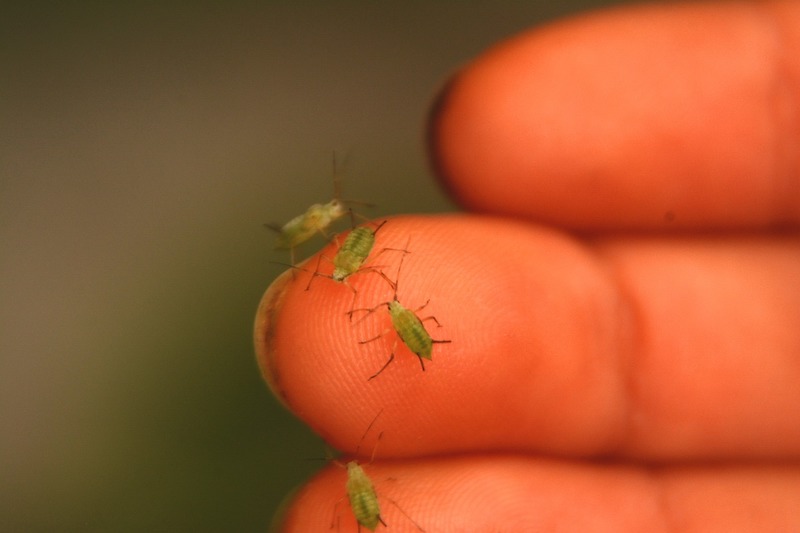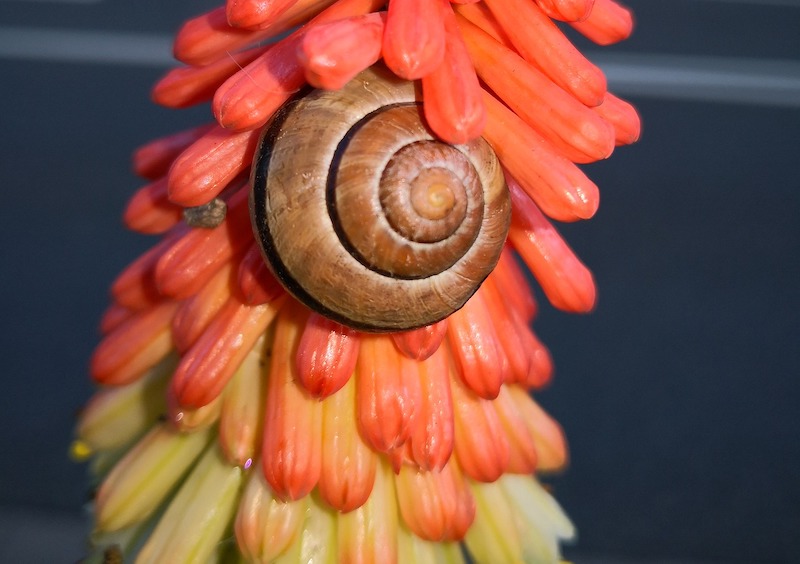Red Hot Poker, aka Kniphofia spp, is one of the hardiest and most low-maintenance perennials to grow in a pollinator or ornamental cottage garden. Year after year, they return to put on a long-lasting display of color. Because this plant is so easy to grow and care for, it may come as a surprise that several pests can afflict Red Hot Poker. The two main pests are aphids and gastropods (slugs and snails). Both can be treated using safe, organic methods.
Common Red Hot Poker Pests
Aphids
Aphids are sap-sucking pests that feed on tender new growth of foliage and are most common early in the growing season. Red Hot Poker leaves are tender as they emerge in the spring and can be susceptible to aphids, especially if the plant is growing in rich soil or has been heavily fertilized. The aphids are usually green or white. Small numbers will not cause much damage to the plant, but large infestations can weaken the growth and health of a plant over time.
If the aphids multiply and spread to other parts of the plant, secondary infections may result. Aphids release a sticky honeydew that is full of sugar and will attract ants that harvest the honeydew. The honeydew also causes a fungus called sooty mold to grow.

Treating Aphids on Red Hot Poker
The best way to control Aphids is to entice beneficial predators into your garden. Lady beetles and lacewings are the two best predators of aphids. Lady beetle larvae eat a large number of aphids in a day, up to 10 times the amount of an adult beetle. You can also try washing the aphids off with a sharp stream from the hose. Do this carefully so that you do not damage any tender new growth. Concentrate on spraying the undersides of the leaves, where most of the aphids feed. Damaged leaves that are curling in or turning brown should be removed to help control the spread of the aphids.
Preventing Aphids on Red Hot Poker
Aphids are drawn to lush new growth early in the growing season or after heavy feeding with quick-acting liquid fertilizers. Use a slow-release fertilizer early in the spring to support consistent growth all season long. Avoid applying fertilizers with high nitrogen, as too much nItrogen promotes weak, vulnerable foliage growth. Make sure your plant is located in full sun with at least 6 hours of direct sun exposure. Red Hot Poker grows poorly in shade and is more susceptible to pests and diseases.
Gastropods
Slugs and snails are part of the gastropod family of mollusks. These pests are mostly active during the evening and early morning, or in shady and sheltered locations of the garden. Gastropods slide along the ground using a slime they exude from their bodies, and avoid traveling over rough and sharp materials such as gravel or chipped bark mulch. Often these pests are drawn to tender foliage and other soft plant parts. The juicy young growth of Red Hot Pokers may entice these pests at the ground level. With a little protection, Red Hot Pokers often outgrow the threat and recover from any damage. Typical damage appears as ragged edges and tips of the leaves. You may also see the telltale sticky trails around the plants.

Treating Gastropods on Red Hot Poker
Gastropods may seem like a nuisance, but they are a vital part of the soil lifecycle web. They are efficient in breaking down organic matter, such as in a home compost pile, and serve as a food source for many mammals and birds. Keep in mind that using a toxic pesticide to control slugs and snails may also cause damage to birds, small mammals, and family pets.
Try trapping slugs and snails in shallow dishes of beer or another tasty beverage. The trap draws gastropods into the containers, where they drown in the night. Make sure to empty and refresh the containers every day. If populations of snails and slugs are high, try using a slug bait made exclusively from iron phosphate, which is nontoxic to other wildlife and breaks down into fertilizer in garden soil. Sluggo is the best-known brand and is very effective at keeping gastropod levels low.
Preventing Gastropods on Red Hot Poker
Protect prized plants from gastropods by scattering slug repellent. Applying Diatomaceous Earth around plants also is effective. The sharp particles keep gastropods from traveling over the soil to get to your plants. These treatments may need to be reapplied after heavy summer rains.
Red Hot Poker Pests Chart
|
Pest |
Identifying |
Treating |
|
Aphids |
Tiny, soft-bodied insects, typically green, yellow, brown, red, or black |
Entice beneficial predators into your garden such as Lady beetles and lacewings |
|
Gastropods |
Shiny, silvery trails on the leaves or stems |
Trap slugs and snails in shallow dishes of beer or another tasty beverage |
Sources: "Kniphofia." The Royal Horticultural Society. rhs.org.uk


